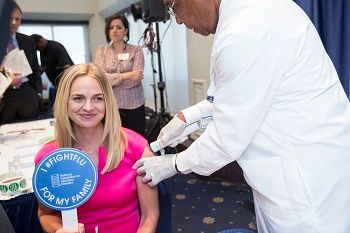Article
Flu Season and Flu Vaccine: NFID Conference Reveals What You Need to Know
Author(s):
The benefits and risks of vaccinations have been in the forefront of the news lately, especially with children going back to school and presidential debates heating up. Although the Centers for Disease Control and Prevention (CDC) continuously advise that all eligible candidates receive a vaccine, some remain skeptical. The National Foundation for Infectious Diseases (NFID) hosted their annual news conference to discuss the 2014-2015 flu vaccine outcomes and what you need to know as we approach the next season.

The benefits and risks of vaccinations have been in the forefront of the news lately, especially with children going back to school and presidential debates heating up. Although the Centers for Disease Control and Prevention (CDC) continuously advise that all eligible candidates receive a vaccine, some remain skeptical. The National Foundation for Infectious Diseases (NFID) hosted their annual news conference to discuss the 2014-2015 flu vaccine outcomes and what you need to know as we approach the next season.
Led by Tom Frieden, MD, MPH, director of the CDC, the conference took place in Washington, DC on September 17, 2015. Everyone over the age of 6 months is recommended by the CDC to a flu vaccine, including older adults which has been a topic of debate. Three common strains of the flu that circulated during the 2014-2015 season were: influenza A (H1N1), influenza A (H3N2), and influenza B viruses.
The conference also touched upon the pneumococcal vaccine, which is approved for those ages 65 and older as well as younger patients with certain health risks. It can be given at the same time as the flu vaccine and patients should make sure that they’re up-to-date on all vaccinations when they go in to get the flu shot.
“Overall, the flu vaccine is usually 50 to 60% effective,” Frieden said during the meeting. However, the H3N2 vaccine was “very poorly matched.”
Previous research released in June 2015 indicated that the viruses acquired mutations which caused the vaccine to only protect one out of every four people who received it. Regardless of the low success rate, Frieden went on to say that there are still benefits to getting the flu vaccine.
“It doesn’t matter which flu vaccine you get, just get one,” Frieden affirmed. He was joined by three other panelists during the conference, including:
- William Schaffner, MD, NFID medication director and professor of preventive medicine and infectious diseases at Vanderbilt University School of Medicine
- Kathleen Neuzil, MD, MPH, professor of medicine and director of the Center for Vaccine Development at the University of Maryland School of Medicine
- Wendy Sue Swanson, MD, MBE, pediatrician, blogger, and executive director of digital health at Seattle Children’s Hospital

Pictured from left to right: Dr. William Schaffner, Dr. Tom Frieden, Dr. Kathleen Neuzil and Dr. Wendy Sue Swanson at the National Foundation for Infectious Diseases news conference. Photo Courtesy of the National Foundation for Infectious Diseases.
One of the most common questions about the vaccine, Schaffner explained, is if it can cause the flu — which it cannot. It’s not too late to get a vaccine in October, November, December, or even January. Neuzil mapped that the flu tends to teeter off in December and come back in March. With today’s technology, those who would prefer to avoid needles have the option to get the nasal spray vaccine.
“We do, of course, want all healthcare providers to be immunized,” Swanson said. Flu viruses mutate from year-to-year which makes it necessary to get a new one annually. One goal is to cut down the amount of time it takes to create the flu vaccine, while still having enough doses for everyone who wants to get one, in order to make it later in the season for improved efficacy.
The discussion continued with verifying pregnant women should be vaccinated no matter which trimester they are in. Not only does it protect the mother, but it helps the baby until they reach the eligibility for the vaccine. Children are more likely to get severe cases of the flu since adults have been exposed to it and tend to build up some immunity.
The panelists also spoke on CNN’s Republican debate that unfolded on the evening of September 16. Candidate Donald Trump suggested that spacing out the doses of vaccines would make them safer and reduce the risk of autism, a condition that some believe to be a potential side effect of vaccinations. However, Swanson brought up a response released by the American Association of Pediatrics “to correct false statements” about vaccines. Not only did it reiterate that vaccines work, but it’s dangerous to public health to suggest an alternative dosing schedule.
“Delaying vaccines only leaves a child at risk of disease for a longer period of time; it does not make vaccinating safer,” the statement continued. “Vaccines are one of the safest, most effective and most important medical innovations of our time.”
No science has ever proven the link the administration of vaccine and autism, the panelists agreed.
Frieden brought the discussion portion to a close by receiving his annual flu vaccine. He pinpointed three actions to protect yourself while also prevent transmitting the virus to others:
- Get vaccinated
- Take everyday preventive actions (ie. stay home if you’re sick)
- If your doctor prescribes antiviral drugs, take them — CDC research has found that starting those medications early can reduce severity of the illness as well as the duration of it by about a day

Dr. Wendy Sue Swanson gets her flu vaccine at the National Foundation for Infectious Diseases 2015 Influenza/Pneumococcal news conference. Photo Courtesy of the National Foundation for Infectious Diseases.





